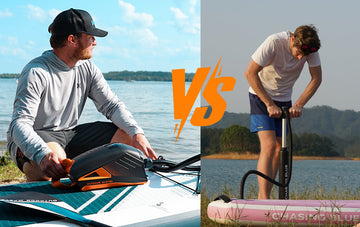Manual vs. Electric SUP Pumps: Which One Wins for Your Next Adventure?

Imagine this: You're at the beach, ready to hit the water with your inflatable paddleboard (iSUP). Your friend grabs a manual pump and starts cranking away, beads of sweat forming on their forehead. Meanwhile, you plug in your electric pump, press a button, and within minutes, your board is perfectly inflated—leaving you time to snap a sunrise photo or help others with their gear. Sounds too good to be true? Let's dive into the ultimate showdown between manual and electric SUP pumps.
Manual Pumps: The OG Workhorse (But Maybe Not for Long)
Manual pumps have been around since the dawn of inflatable boards, and they've got a loyal fanbase. Here's why some folks still swear by them— and why others are ditching them faster than a popped inner tube.

Pros (Why They're Still Around)
1. Budget-Friendly Beginnings
If you're dipping your toes into SUP for the first time, a manual pump won't break the bank. Entry-level models start at $30–$100, making them ideal for casual users who prioritize cost over convenience.
2. Ultra-Lightweight & Portable
Weighing in at just 1–3 lbs, manual pumps are a dream for backpackers or anyone schlepping gear to remote lakes. They're compact enough to stash in a board bag without adding bulk.
3.No Power Required
Forget about dead batteries or finding a car outlet—manual pumps work anywhere, anytime. Handy for off-grid adventures or when you're too lazy to charge your gadgets.

Cons (Why Your Arms Will Hate You)
1. Arm Day, Every Day
Inflating a board to 15 PSI takes 10–15 minutes of non-stop pumping—equivalent to doing 500 push-ups. By the end, your shoulders will scream, “Why did I skip the gym this week?!”
2. Pressure Guessing Game
Manual pumps rely on analog gauges or guesswork to judge pressure. Newcomers often overinflate (the board becomes too hard to control) or underinflate (it gets too soft and wobbly, prone to tipping over). In fact, 37% of users admit to misjudging the pressure.
3. Environmentally Sensitive
Cold weather? Rubber seals stiffen, slowing airflow by 40%. Hot days? You'll tire out faster, adding 20–30% to inflation time. Sand and saltwater also wreak havoc on valves, leading to frequent repairs.

Electric Pumps: The Lazy Genius Upgrade
Electric pumps are like having a personal assistant for your SUP. They're not perfect, but they'll save you time, energy, and maybe even a friendship or two.
Pros (Why They're a Game-Changer)
1. Lightning-Fast Inflation
Dual-stage technology is the secret sauce: High-flow mode blasts air at 350-450 L/min to shape the board, then precision mode hits 15 PSI in 3–5 minutes—no arm strain required.
2. Set It and Forget It
Digital pressure sensors (±0.5 PSI accuracy) and auto-shutoff eliminate guesswork. No more “Is 14 PSI enough?” debates—just program your target and relax.
3. Built for the Wild
Cold-rated models work at –10°C, while sealed designs (IPX4 waterproof) can withstand light sand and sea spray. Plus, rechargeable batteries (3–5 inflations per charge) and dual power options (USB-C, car adapter) mean no dead ends.
4. Multitasking Marvels
While your pump does its thing, you can prep paddles, apply sunscreen, or coach beginners on balance. Time saved = more time paddling!
Cons (Nothing's Perfect)
1. Initial Price Sting
Electric pumps cost $150–$400 upfront, which might make budget-conscious buyers hesitate. But here's the kicker: Frequent users save 10–15 hours/year (that's 40+ extra paddling sessions!)—ROI in 6–12 months.
2. Weight & Bulk
At 5–6 lbs, electric pumps are heavier than manual ones. But let's be real—if you're driving to the beach, a few extra pounds won't kill you. For hikers, opt for lightweight lithium-ion models.
3. The Verdict: When to Choose Which
Still torn? Let's break it down with a handy table:

Why Electric Pumps Are the Future (Spoiler: They're Already Here)
While manual pumps have their niche, electric models dominate in efficiency, safety, and inclusivity. Here's why:
● Efficiency: 3–4x faster inflation, critical for pros or families with multiple boards.
● Safety: Precision pressure control reduces board damage risks, especially for high-stiffness iSUPs.
● Long-Term Value: Lower lifecycle costs for frequent users, driven by reduced maintenance.
● Inclusivity: Accessible to all skill levels—no “pumping prowess” required.
The Ultimate Recommendation: Meet the Shark 3
If you're ready to level up, look no further than the OutdoorMaster Shark 3—the Swiss Army knife of electric pumps. Here's why it's a crowd favorite:
 Key Features
Key Features
1. Speed Demon
Dual-stage inflation crushes 15 PSI in 5 minutes flat for most boards, with active cooling to prevent overheating.
2. Battery Beast
A 74Wh battery powers 4 full inflations on a single charge, plus it doubles as a USB-C power bank for your phone—handy for camping trips.
3. Rapid Dual Stage & Auto Shut-off
The Shark 3 features dual-stage inflation. It quickly inflates the board initially, then precisely reaches 15 PSI. Auto shut-off stops inflation at the preset pressure, preventing over-inflation hassle-free.
4. Versatility King
Eight valve adapters work with SUPs, kayaks, inflatable beds, and even kites. Plus, three modes (SUP, Kite, Mat), remember your settings for next time.
What the Pros Say
● Inflatableboarder.com: “The Shark 3 is ridiculously fast… a game-changer for anyone serious about SUP.”
● SUPboardguide.com: “My go-to pump—quiet, reliable, and built to last. 2-year warranty? Chef's kiss.”
Final Thoughts
Manual pumps are like flip phones—reliable in a pinch, but why settle when smartphones exist? The Shark 3 isn't just a pump; it's a ticket to more time on the water, less stress, and happier arms. So ditch the manual grind, embrace the electric revolution, and let your pump do the heavy lifting. Your shoulders (and Instagram feed) will thank you.

Pro Tip: Always check your pump's PSI requirements and match them to your pump's specs. And if you're buying the Shark 3, grab a portable car charger for those spontaneous road trips—adventure awaits! 🌊🚗
Upgrade Your Setup: Shop Shark3 Rechargeable Electric SUP Pump













